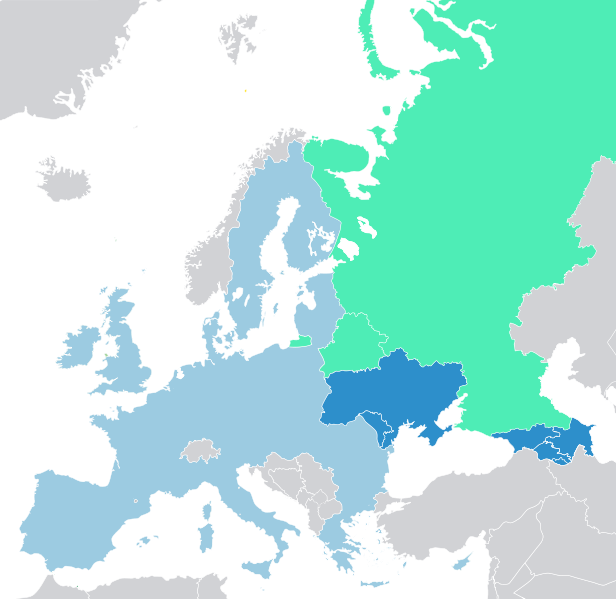Confirmation of a Standstill
May 4, 2013 -
Olga Adamczyk
-
Articles and Commentary

616px-Eastern_Partnership.svg_.png
At the end of 2012 the Estonian Center of Eastern Partnership published a report concerning the state of public administration in the countries that take part in the programme. This is the second edition of the summary, after a similar report was published in December 2011. The authors, Vugar Bayramov, Kakha Gogolashvili, Angela Secrieru, Alexei Sekarev and Liudmyla Shanghina, investigated different aspects of the public sector in areas which are key from the European point of view.
Their observations and comments do not differ with the annual reports of the European Commission, the High Representative of the Union for Foreign Affairs and Security Policy Catherine Ashton, and the European Commissioner for Enlargement and European Neighbourhood Policy Štefan Füle.
The first part of the report summarises the last five years of the existing Eastern Partnership’s (EaP) idea and the required reforms that must be implemented during the first few years of the programme. Generally, an analysis of these years shows an improvement in most spheres of public administration of the EaP countries. There are some principles which were taken into consideration when compared to the earlier report In the 2012 report, however, the analysis of the authors focuses mainly on the improvement that was meant to happen during 2012.
The investigated areas included reliability and predictability detailed in the rule of law; favouritism in government decisions; irregular payments and bribes; openness and transparency in policy making; corruption perception and e-government analyses; accountability and freedom of speech; judicial independence; diversion of public funds and the ease of doing business; efficiency and effectiveness detailed in regulatory quality; government effectiveness and wastefulness of government spending; and last but not least – the condition of public institutions. However, the authors did not dig very deeply into the details, but simply tried to look at the scope of the changes that were expected and required.
The question that should be raised at this current moment is whether the criteria of the evaluation should have been the same for each country. There is no secret that from the very beginning the states participating in the EaP programme differed considerably in almost all aspects of political, social and economic life. Because of this, putting the same measures universally for each country seems risky. Fortunately, it seems that authors attempted to take this somewhat into account and aimed to be fair in their assessments..
In the second part of the report, particular aspects of public administration were analysed, merged and then rated. What is more, at the end of each module, the authors tried to predict the coming trends of each area. Countries were compared with the situation of EU member states, which was quite interesting and sometimes surprising. For example, Belarus and Moldova made more effort last year to use e-governance than Poland or the Czech Republic. All of the measures were presented graphically showing the level of improvement over the previous year and in comparing with other EaP countries. This helps the reader to realise what great – or small – efforts have been undertaken in some areas of each country to fulfil the EU’s principles.
Naturally, not every country could easily go for everything. Mostly, the Eastern partners focused on improving a few aspects of its public administration while ignoring others. The question is: is this a better approach than trying to address all the problems at the same time? It is hard to say, because none of the identified problems in public administration were, indeed, solved.
Some were just given more attention, but does not mean the results were satisfying. For instance, there was a significant steps concerning corruption in Azerbaijan. Nevertheless, despite the fact that on a judicial level the government is prepared to fight against this occurrence, in the practical dimension it is extremely difficult.
A similar situation is with other aspects of public administration in the rest of EaP countries. The most difficult cases were connected with Belarus, where almost all of the factors and measures went down since 2011. Areas such as the rule of law, openness and transparency and accountability the freedom of speech, judicial independence and diversion of public funds were considered very poor.
Of course, there is some good news. In most of the analysed modules, the countries that lead in the Eastern Partnership, Moldova and Georgia, showed that they deserve this title, although the authors also recognised positive changes in the rest of the EU's Eastern partners – for instance, concerning diversion of public funds in Armenia and Ukraine, e-government in Belarus, government effectiveness in Georgia, and the slow but permanent increase of the rule of law in Moldova.
As mentioned earlier, these conclusions coincide with analyses of EU experts. Annual reports that are prepared for the European Commission cover a wider spectrum of areas and aspects of changes that are expected from the EaP partners. Based on this, the High Representative of the Union for Foreign Affairs and Security Policy Catherine Ashton and European Commissioner for Enlargement and European Neighbourhood Policy Štefan Füle make their decisions about specified problems in those countries, pay more attention to certain issues and take action where required.
It is obvious that if more and more institutions of international affairs research, such as the Estonian Center of Eastern Partnership, which conducted its analyses fair and clear, take notice of the Eastern Partnership countries, there is a chance to make their efforts more discernible and effective. At least one can hope.
Olga Adamczyk is a graduate of political science at the Jagiellonian University in Krakow, Poland and a contributor to New Eastern Europe.

































